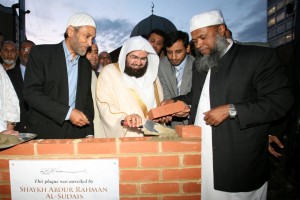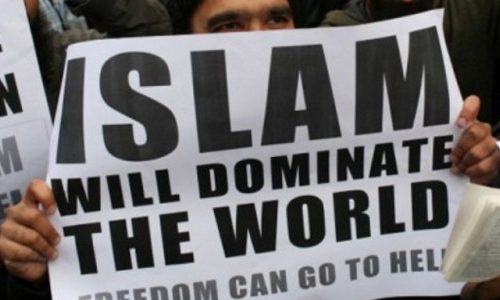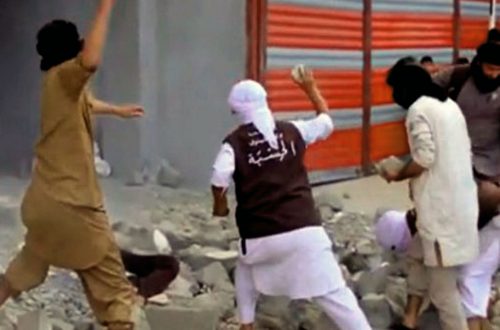Muhammad Abdul Bari, chairman of the East London Mosque and former secretary general of the Muslim Council of Britain (MCB), has written an indignant letter to the Observer about Nick Cohen’s piece on extremism in universities.
Through the usual tactic of guilt by tenuous association, Nick Cohen brands me, in all but name, an extremist, a label I utterly reject. I abhor extremism of any kind and continue to work tirelessly to bring communities together.
Oh really? This is hilarious coming from a man whose mosque has hosted hate preachers for years and years. Even one of the worst, al Qaeda recruiter Anwar al Awlaki, was not considered beyond the pale. Recall that Bari’s response to a query about Awlaki in January 2009 from Conservative MP Paul Goodman was this:
He wrote that “we saw no need to revoke the permission for the event based on one article in the Daily Telegraph, whose record on reporting our institution or our community does not inspire us with much confidence”. He didn’t address the US Department of Homeland Security’s view.
He did write that “we found no evidence that the event was promoting hate”.
Yes, never mind al Qaeda in your mosque, just moan about the Telegraph.
Bari’s letter continues:
Cohen labours hard to smear the East London Mosque, where I am currently the chairman. In his latest diatribe, he wrongly claims the mosque is dominated by Jamaat-e-Islami. I hold no brief for Jamaat-e-Islami. The East London Mosque is run by British Muslims of diverse backgrounds, with deep roots in the community, who expend time and energy to make it an institution that is welcoming to all faiths and none.
The mosque’s links to Jamaat-e-Islami are a matter of record. Consider this report (pdf) commissioned by the government:
The JI helped to create and subsequently dominate the leadership of the MCB, currently the largest Muslim umbrella body in Britain, with around 500 affiliates representing a broad set of orientations. Vying for the leadership of the MCB are the Pakistani and Bangladeshi wings of JI, alongside the Muslim Brotherhood and some politicised Deobandis. The current Secretary General is the Chair of the East London Mosque, the key institution for the Bangladeshi wing of JI in the UK.
Or read this essay by Delwar Hussain:
The Islamists, by contrast, are sophisticated and up-to-date in their focus and appeal. The East London Mosque (and its affiliate, the London Muslim Centre [LMC]) shares the ideology of the Jamaat-e-Islami.
…
A Bangladeshi Jamaat MP, Delwar Hossain Sayedee, has regularly appeared at the mosque and raised funds for his party there. These visits are controversial: older Bangladeshis accuse him of involvement in the massacres of Bengalis during the liberation war. But the Jamaat has made strenuous (and successful) efforts to distance itself from its extremist and anti-Bengali past, and young, third-generation, British-born Bengalis have demonstrated in support of Sayedee’s presence.
…
In Bangladesh, secularists and the left have been marginalised and suppressed by the post-2001 ruling coalition. While the Bangladesh Nationalist Party – and George Galloway in London – seek to ride the Jamaat-e-Islami tiger for political gain, the prospects of this strategy for resolving the enduring questions of social justice, equality and diversity are dim. Jamaat and other fundamentalist groups are sowing the seeds of future conflict, as well as obscuring more hopeful and humane pathways to equity and harmony for Bengalis, in both Britain and Bangladesh.
A visit in 2006 was indeed controversial:
In leaked e-mails seen by The Times, the Home Office sought advice from research analysts in the Foreign Office while considering the case for excluding Mr Sayeedi.
Internal messages between advisers discussed the threat that he allegedly posed, and one attached a report from a Bangladeshi human rights organisation. The report quotes Mr Sayeedi as saying that Britain and the US “deserve all that is coming to them” for overturning the Taleban in Afghanistan.
The e-mail from one adviser, Eric Taylor, continues: “He [Mr Sayeedi] has made a particularly offensive comment about Bangladeshi Hindus, comparing them to excrement. He also appears to defend attacks against the Ahmadiya (Islamist) community.
“. . . Previous visits to the UK have been reportedly marred by violence caused by his supporters. In 2000, during one of his talks in Oldham, his supporters reportedly attacked and beat up five Bengali elders.
“A rally in Banglatown was also attacked and three people, including a 65-year-old, were injured. A Bangladeshi community group wrote to the Prince of Wales in June 2004 appealing for Sayeedi to be banned from the UK.”
What was the mosque’s response? Say nothing:
No one from the East London Mosque was available for comment.
Bari’s letter also includes this line about prominent Saudi preacher Abdul Rahman al Sudais:
Cohen fails to mention that the “Saudi preacher” he refers to is Sheikh as-Sudais, a leading imam at Islam’s holiest sanctuary in Makkah. The remarks attributed to him have never been uttered at the East London Mosque and I have no hesitation in dissociating myself and our mosque from such views.
Extremism and bigotry of any kind are to be confronted. Nick Cohen would do well to reflect on his own divisive rhetoric.
Right, so if BNP leader Nick Griffin promises not to say anything nasty he would be welcome to make a speech at the mosque? What kind of argument is that?
As for “dissociating”, is this how Bari thinks it is done? Here he is to Sudais’s right, awarding (pdf) the sheikh his very own plaque on the mosque’s extension project.
You can read all about Sudais’s extremism and bigotry here. A sample:
Read the history to know that yesterday’s Jews are evil predecessors and today’s Jews are worse successors. They an ingrate people, they altered God’s words, worshipped calf, killed Messengers and denied their Messages. They are exiled people and the worst of mankind. Allaah cursed them and cast His wrath upon them. He turned some of them to monkeys and pigs and worshippers of creatures. They are worst in position and are astray from the right path.
History of Jews is full of deception, trickery, rebellion, oppression, evil and corruption. They always seek to cause mischief on the earth and Allaah loves not the mischief-makers.
That visit too was controversial and there were protests. The mosque’s response? “Islamophobia!”
The director of the East London Mosque was stalwart in defence of Al-Sudais, however: “These are some of the old reports by Islamophobes. He is very popular. He’s not just coming to our mosque, he is also visiting major mosques around the country.”
Muhammad Abdul Bari is a dissembler. His words on extremism are a joke.
No one should fall for them.
Update: this tape demonstrates just how long Bari has been at it. It is a BBC interview recorded in 2004, when coalition and Iraqi soldiers, including the Black Watch, were trying to retake Fallujah from al Qaeda jihadis. You can hear Bari, then deputy secretary general of the MCB, from 4:25 in.
Roger Bolton “You’ve called the assault on Fallujah barbaric. Wasn’t its occupation by Iraqi militants and foreign fighters, using civilians as shields, also barbaric?”
Abdul Bari “Well we have to see what happened in the beginning, as mentioned by some of your, some of the people you interviewed, and I think agreed by the international community, that the occupation of Iraq was illegal. So, if people of Iraq come up and want to fight against the occupation army, we know that, we also mentioned somewhere, we know that there could be some people from outside Iraq that are coming and that is because the main reason that the occupation happened.”
Roger Bolton “Do you think therefore that armed resistance of the sort we are seeing in Fallujah is legitimate? You would support the fighters who are ranged against American and British troops?”
Abdul Bari “Well, people of Iraq have to decide, because the war has been imposed on them.”
Roger Bolton “I’m sorry sir, I was asking if you, not the people in Iraq, do you therefore think it is legitimate for people to fight against the American and British troops in Iraq?”
Abdul Bari “Well, it’s for the people of Iraq to decide.”
Roger Bolton “But it certainly could be legitimate, you’re not telling them it’s wrong.”
Abdul Bari “Well, what we are saying is that the occupation of Iraq itself was wrong”
The “people of Iraq” and “some people from outside Iraq” at work in Fallujah:
And here is a debate about extremism on campus which should interest this blog’s readers. It’s on Tuesday 26 October at 6:30 PM at the JZ Young lecture theatre in UCL’s Anatomy Building on Gower Street. The debaters are:
Fiona Caldicott
Chair of the review into Abdulmutallab’s time at UCL; former principal of Somerville College, Oxford.
Muhammad Abdul Bari
Member of the Caldicott Enquiry; former Secretary-General of the Muslim Council of Britain.
James Brandon
Head of Research and Communications at the Quilliam Foundation.
Shiraz Maher
Senior Fellow, International Centre for the Study of Radicalisation and Political Violence, King’s College London, and a member of the advisory board for Student Rights.
Michael Worton
Vice-Provost (Academic and International) of UCL.
Chairman: BBC Home Affairs correspondent Daniel Sandford.



